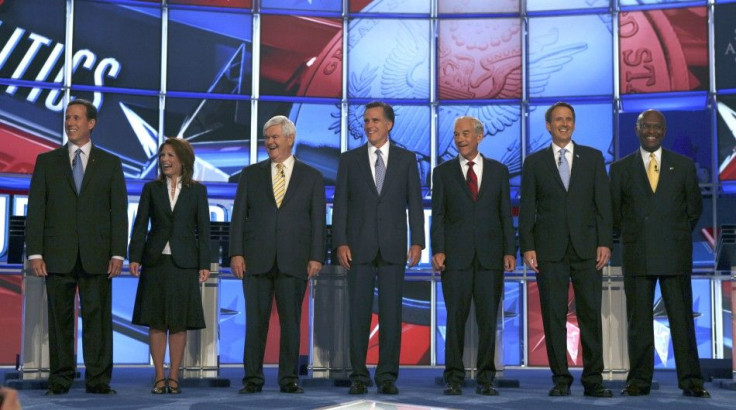Romney, Bachmann Emerge as GOP Frontrunners

The consensus from last night's debate between Republican presidential candidates holds that former Massachusetts governor Mitt Romney and Rep. Michele Bachmann (R-MN) set themselves apart from a still chaotic field.
Recent polls have established Romney as a frontrunner and he solidified his claim to that status, advancing the message of successful economic stewardship that has been a centerpiece of his campaign. He redoubled his criticism of President Obama's economic policies, reiterating his opposition to the Obama administration's bailout of auto companies.
This president has failed, Romney said. And he's failed at a time when the American people counted on him to create jobs and get the economy going.
Romney's conservative credentials have been questioned for his role in enacting universal healthcare in Massachusetts -- prior to the debate, Tim Pawlenty coined the term Obamneycare in an attempt to conflate the Massachusetts law with the federal healthcare overhaul -- but Romney sidestepped any attacks by repeating his mantra of leaving decisions on healthcare policy to the states, and Pawlenty avoided attacking Romney.
Ours was a state plan, a state solution, and if people don't like it in our state, they can change it, Romney said. That's the nature of why states are the right place for this type of responsibility. And that's why I introduced a plan to repeal Obamacare and replace it with a state-centric program.
Michele Bachmann entered the debate still formally undecided and used the public exposure as an opportunity to formally launch her campaign and to introduce herself to voters. Bachmann has capitalized on populist resentment of the Obama administration as chair of the newly founded House Tea Party caucus, and last night she doubled down on her message of vowing to repeal Obamacare.
We cannot risk giving President Obama four more years to dismantle our nation, Bachmann wrote in a fundraising letter released prior to the debate. We must act now.
Some political observers had dismissed Bachmann as an imitation Sarah Palin, a Tea Party darling without the former Alaska governor's recognition or influence. But Palin was absent last night, and Bachmann seized the opportunity. Ezra Klein writes that she delivered an easy, fluent discussion of policy points, adding that Her candidacy has mostly been greeted as a longshot bid, but on the stage last night, she came across as one of the primary's clear heavyweights.
Dante Scala, an associate professor of political science at the University of New Hampshire in Durham, wrote in an analysis for CNN that Bachmann laid a strong claim to the bloc of conservative voters, whether evangelical Christians or tea party activists, that all the candidates are appealing to.
Bachmann stood head and shoulders above the rest in this area, presenting herself as a strong, authentic, positive proponent of the conservative message, Scala wrote.
© Copyright IBTimes 2025. All rights reserved.




















